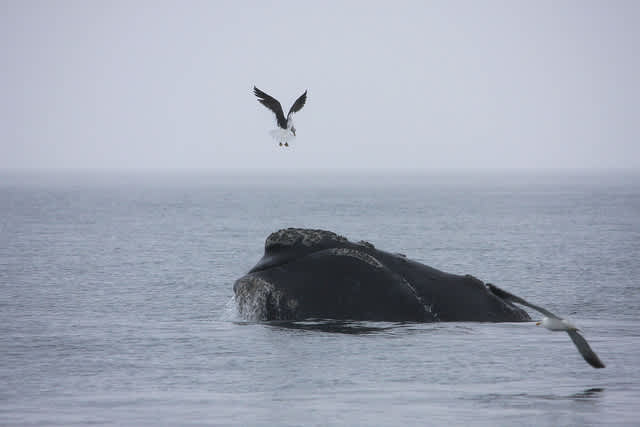Argentine Official Unveils Seagull Culling Plan to Save Whales
OutdoorHub Reporters 08.29.12

Reminiscent of a scene out of Alfred Hitchcock’s The Birds, seagulls have learned to peck away the skin of breaching whales to feed on their flesh. The open wounds caused by the pecking harm the whales and drives away tourists who come the Patagonia region in Argentina to watch whales, especially southern right whales, in their birthing grounds.
Gull attacks around the Valdez Peninsula were rare until about eight years ago, said Milko Schvartzman to the The Guardian. Schvartzman coordinates the oceans campaign for Greenpeace in Latin America. The habit has developed over time as seagulls have found a food reward as a result of the attacks.
In an interview with the AP, Marcelo Bertellotti, who works with the National Patagonia Center, a governmental conservation agency, said, “It’s not just that the gulls are attacking the whales, but that they’re feeding on them, and this way of feeding is a habit that is growing and becoming more frequent.”
This has changed the whales’ behavior. When they would normally breach the water and display their tails, they now just barely surface and breath through their blow-holes before descending.
Bertellotti proposed the plan to shoot 100 seagulls and recover the birds’ bodies before they are eaten and cause more harm to marine life. The plan is called the “100-day-Whale-Gull Action Plan.” The government of the Chubut Province has approved the plan and provincial officials support it.
Undoubtedly, the plan has met with opposition from environmentalist groups who say seagulls are not the root of the problem, but that human trash, which has contributed to an explosion in the seagull population, is to blame. The groups want to close open-air garbage dumps around the area and stop people from dumping fish parts.
Chubut Environmental Minister Eduardo Maza said previous governments are to blame, but shooting seagulls would be a step in the right direction. He said more permanent action will be taken. “[Shooting seagulls] is surely not the most pleasant measure, but it’s necessary to do something to control a situation that has been growing after many years of inaction,” Maza said.

